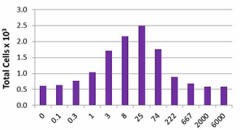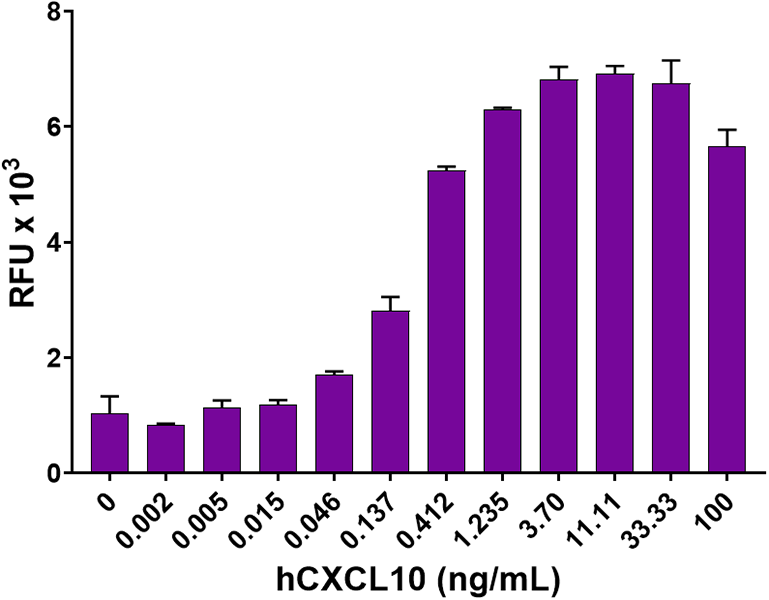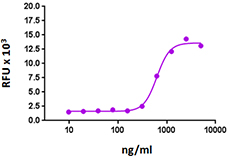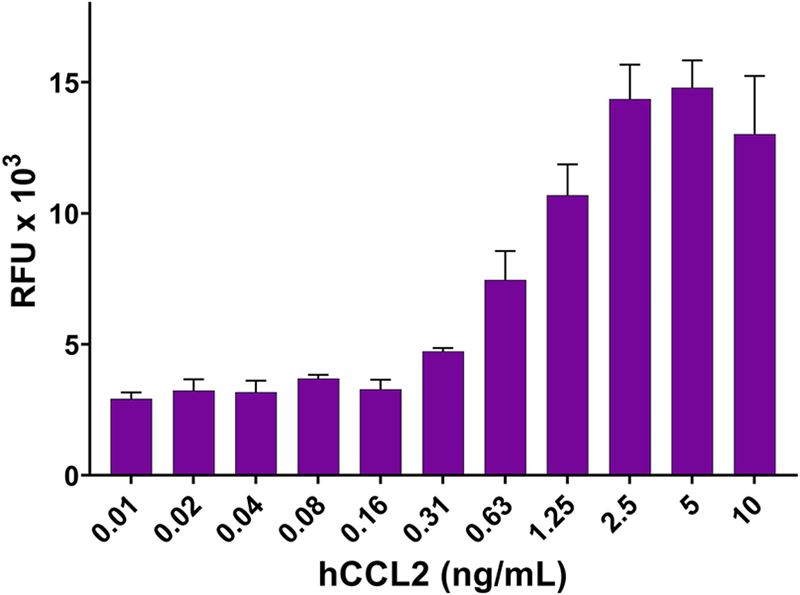- Regulatory Status
- RUO
- Other Names
- Interferon-inducible T-cell alpha chemoattractant (ITAC), Small inducible cytokine, subfamily B, member 9B (SCYB9B), Small inducible cytokine, subfamily B, member 11 (SCYB11)
- Ave. Rating
- Submit a Review
- Product Citations
- publications

-

Human CXCL11 chemoattracts Baf3-mCXCR3 transfectants in a dose dependent manner. The ED50 = 1-5 ng/mL.
CXCL11 is a CXC chemokine lacking the ELR (Glutamate-Leucine-Arginine) tripeptide motif, which is functionally and structurally related to CXCL9 and CXCL10. CXCL11, together with CXCL9 and CXCL10, specifically binds to the G protein-coupled receptor CXCR3 and is involved in chemotaxis of immune cells and angiogenesis. Expression of both CXCR3 and CXCL11 by the Th1-associated cytokine IFNγ creates an amplification loop of cell-mediated immune response between Th1 cells. CXCR7 has been identified as an alternate receptor for CXCL11 and is involved in growth, survival, and adhesion of tumor cells.
Product DetailsProduct Details
- Source
- Human CXCL11, amino acids Phe22-Phe94 (Accession# NM_005409.4) was expressed in E. coli.
- Molecular Mass
- The 74 amino acid recombinant protein has a predicted molecular mass of approximately 8.3 kD. The DTT-reduced protein migrates at approximately 11 kD and non-reduced protein migrates at approximately 13 kD by SDS-PAGE. The N-terminal amino acid is Methionine.
- Purity
- >98%, as determined by Coomassie stained SDS-PAGE.
- Formulation
- 0.22 µm filtered protein solution is in PBS.
- Endotoxin Level
- Less than 0.01 ng per µg cytokine as determined by the LAL method.
- Concentration
- 10 and 25 µg sizes are bottled at 200 µg/mL. 100 µg size and larger sizes are lot-specific and bottled at the concentration indicated on the vial. To obtain lot-specific concentration and expiration, please enter the lot number in our Certificate of Analysis online tool.
- Storage & Handling
- Unopened vial can be stored between 2°C and 8°C for up to 2 weeks, at -20°C for up to six months, or at -70°C or colder until the expiration date. For maximum results, quick spin vial prior to opening. The protein can be aliquoted and stored at -20°C or colder. Stock solutions can also be prepared at 50 - 100 µg/mL in appropriate sterile buffer, carrier protein such as 0.2 - 1% BSA or HSA can be added when preparing the stock solution. Aliquots can be stored between 2°C and 8°C for up to one week and stored at -20°C or colder for up to 3 months. Avoid repeated freeze/thaw cycles.
- Activity
- Bioactivity was measured by its property to chemoattract Baf3-mCXCR3 transfectants in a dose dependent manner. The ED50 = 1 - 5 ng/m L.
- Application
-
Bioassay
- Application Notes
-
BioLegend carrier-free recombinant proteins provided in liquid format are shipped on blue-ice. Our comparison testing data indicates that when handled and stored as recommended, the liquid format has equal or better stability and shelf-life compared to commercially available lyophilized proteins after reconstitution. Our liquid proteins are verified in-house to maintain activity after shipping on blue ice and are backed by our 100% satisfaction guarantee. If you have any concerns, contact us at tech@biolegend.com.
-
Application References
(PubMed link indicates BioLegend citation) -
- Erdel M, et al. 1998. Cytogenet Cell Genet. 81:271.
- Laich A, et al. 1999. J. Interferon Cytokine Res. 19:505.
- Cole KE, et al. 1998. J. Exp. Med. 187:2009.
- Miekus K, et al. 2010. Folia Histochem. Cytobiol. 48:104.
- Colvin RA, et al. 2004. J. Biol. Chem. 279:30219.
- Burns JM, et al. 2006. J. Exp. Med. 203:2201.
- Product Citations
-
Antigen Details
- Structure
- Chemokine
- Distribution
- T lymphocytes, keratinocytes, monocytes, macrophages, fibroblasts, endothelial cells.
- Function
- CXCL11 is a strong chemoattractant for activated T lymphocytes and NK cells. CXCL11 also has non-chemotactic functions, including stimulation of IFN-γ expression by immune cells and inhibition of angiogenesis. CXCL11 expression is upregulated in response to interferons (IFNs).
- Interaction
- Activated T cells, Th1 cells, regulatory T cells, NK cells, and endothelial cells.
- Ligand/Receptor
- CXCR3-A, CXCR3-B, CXCR7
- Cell Type
- Tregs
- Biology Area
- Angiogenesis, Cell Adhesion, Cell Biology, Immunology, Innate Immunity
- Molecular Family
- Cytokines/Chemokines
- Gene ID
- 6373 View all products for this Gene ID
- Specificity (DOES NOT SHOW ON TDS):
- CXCL11
- Specificity Alt (DOES NOT SHOW ON TDS):
- CXCL11
- App Abbreviation (DOES NOT SHOW ON TDS):
- BA
- UniProt
- View information about CXCL11 on UniProt.org
Related FAQs
- Why choose BioLegend recombinant proteins?
-
• Each lot of product is quality-tested for bioactivity as indicated on the data sheet.
• Greater than 95% Purity or higher, tested on every lot of product.
• 100% Satisfaction Guarantee for quality performance, stability, and consistency.
• Ready-to-use liquid format saves time and reduces challenges associated with reconstitution.
• Bulk and customization available. Contact us.
• Learn more about our Recombinant Proteins. - How does the activity of your recombinant proteins compare to competitors?
-
We quality control each and every lot of recombinant protein. Not only do we check its bioactivity, but we also compare it against other commercially available recombinant proteins. We make sure each recombinant protein’s activity is at least as good as or better than the competition’s. In order to provide you with the best possible product, we ensure that our testing process is rigorous and thorough. If you’re curious and eager to make the switch to BioLegend recombinants, contact your sales representative today!
- What is the specific activity or ED50 of my recombinant protein?
-
The specific activity range of the protein is indicated on the product datasheets. Because the exact activity values on a per unit basis can largely fluctuate depending on a number of factors, including the nature of the assay, cell density, age of cells/passage number, culture media used, and end user technique, the specific activity is best defined as a range and we guarantee the specific activity of all our lots will be within the range indicated on the datasheet. Please note this only applies to recombinants labeled for use in bioassays. ELISA standard recombinant proteins are not recommended for bioassay usage as they are not tested for these applications.
- Have your recombinants been tested for stability?
-
Our testing shows that the recombinant proteins are able to withstand room temperature for a week without losing activity. In addition the recombinant proteins were also found to withstand four cycles of freeze and thaw without losing activity.
- Does specific activity of a recombinant protein vary between lots?
-
Specific activity will vary for each lot and for the type of experiment that is done to validate it, but all passed lots will have activity within the established ED50 range for the product and we guarantee that our products will have lot-to-lot consistency. Please conduct an experiment-specific validation to find the optimal ED50 for your system.
- How do you convert activity as an ED50 in ng/ml to a specific activity in Units/mg?
-
Use formula Specific activity (Units/mg) = 10^6/ ED50 (ng/mL)

 Login / Register
Login / Register 














Follow Us